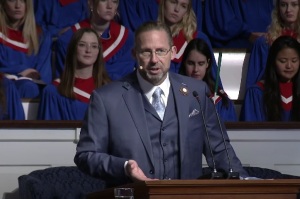Case for Common Core: Pursuing Biblical Justice in America's Education System
Evangelicals must address America's educational crisis with both conviction and compassion. We must not only provide food or shelter to help the impoverished survive day to day, we must equip them to thrive.
Currently 45 percent of children live in low-income families. Yet, only 29 percent of children from the lowest income quartile will enter college, and only 9 percent will finish. Poor preparation for college is standing in the way of these students and a family supporting income. And, as number of jobs that need a degree are only increasing. For years many states have set expectations too low for our students, particularly those from low-income schools. The home school and parochial school parents have long
recognized the lax standards in public schools and insisted on higher standards for their children. But, rigorous standards must be available to all children, especially those in poverty who need clear signals of what skills they need to succeed in college or a career.
The consequences of low standards are pervasive in our education system. Many students with good grades in high school have been told based on previous standards that they were on track to succeed in college. Yet, with half of undergraduates placed in remediation and only 56 percent graduating, countless students quickly found they were unable to succeed at college-level work. Now student achievement in United States lags behind 13 countries in reading and 24 in math. Parents, schools and communities must insist on putting their children's future first by raising expectations for student literacy and math skills, so when our children graduate from high school they have the have the skills to compete in college and the workplace. The Common Core State Standards, adopted by 45 states, set clear consistent guidelines for what students should be able to do at each grade level in math and English Language Arts. The new standards were found to be clearly better than standards recently used in 37 states for English Language Arts and 39 states in math, and on par with educational standards in top performing countries by top researchers.
There are a small vocal group of opponents to these standards with concerns about inhibiting parental choice, undue influence on our children through the creation of a national curriculum. Yet, the evidence many critics provide to support their claims don't include any facts, and many times are simple untruths.
Recognizing the quality of these standards, many religious schools have voluntarily adopted the Common Core. The new standards do not affect the Christian teachings in our schools or our homes, but higher expectations can only help our children understand scripture and communicate biblical truth more clearly in a society in desperate need of clear teaching of the Word of God.
Some Christians have voiced fear that the Common Core was written by the federal government and tied to additional data collection. This is misinformation. In fact, the Common Core standards were commissioned by a bipartisan group of governors and state school chiefs, written by a committee of top educational experts, open for a public review process in which 10,000 pieces of feedback were incorporated from teachers, individuals and institutions. The Common Core was voluntarily adopted by states, and states retain total control over the curricula and assessments developed to meet the standards. By setting high literacy and math standards across states, parents will finally know their child in Tennessee is expected to master the same key skills as their niece in Ohio. Yet their teachers – in public schools, Christian schools and home schools which have taken the challenge to raise standards – will use the curricula of their choice to get there.
I wholeheartedly endorse and support the Common Core State Standards as a critical antidote addressing America's educational malaise. Without question, our children, especially minority students, must participate in an educational system that equips them with the necessary acumen and skills to compete not just locally but globally. With the establishment of rigorous standards in both math and literature, Common Core State Standards empower students with the foundational tools for success.





























